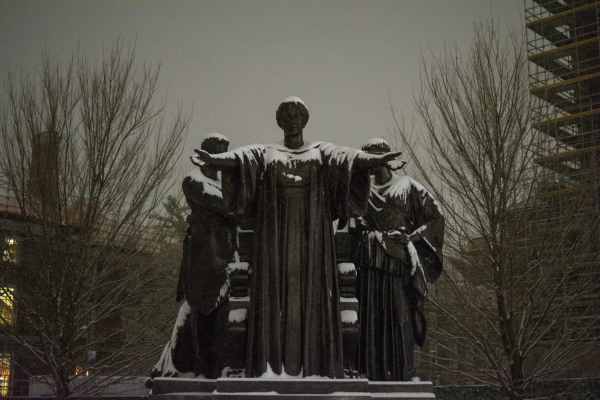Americans are surely uninsured
Apr 12, 2007
As many of our favorite politicians gear up for the 2008 presidential elections, policy rhetoric is slowly but surely becoming ubiquitous. Iraq, social security, immigration, campaign finance and many other issues will be discussed over and over amongst these candidates, first in the primaries and then in the election. There is one issue, though, that I am convinced can and will change the course of this election. And that is health care.
The United States is one of the few Western nations in which health care coverage is not guaranteed by the government. Since no hospitals will turn people away in emergency situations, however, some of those who are uninsured or underinsured get bogged with unmanageable medical bills, debt, and it ultimately spreads the cost of an emergency-care based medical system onto everyone else.
The answer has to be universal health care of some sort. Currently in the U.S. House of Representatives, a bill has been proposed (HR 676) which would create a universal system on the basis of private insurers – mandating that all people buy insurance and subsidizing those who can’t. This is a step in the right direction, however ultimately a single-payer system would be better for Americans.
A single-payer system is one in which everyone contributes some amount of money to a central government-run fund which distributes this money back as health coverage to everyone, and everyone is eligible. This would be cheaper for individuals and businesses while allowing the extra 40 million uninsured to receive benefits, since under such a system preventative medical care would become more common.
People would be more likely to go to the doctor before they became seriously ill since they are covered by insurance; this way, the severe costs of emergency care would often be avoided and medical care in general would be much less expensive.
Get The Daily Illini in your inbox!
The reasons to adopt a single-payer health care system border on being painfully obvious. The thing this country’s health care system prides itself on in quality of care, and for good reason. The United States spends over twice the amount of money per patient as the next largest per capita spender.
This is 15 percent of our GDP and certainly the competitive and private nature of the health care provider market has pushed technological and other advances. These things are wonderful, and the fact is that they would not be hindered by single-payer health care coverage (which does not directly affect health care providers that would remain private.)
Single-payer health coverage managed by the government would vastly improve the lives of those who are currently un- or underinsured. It would remove the burden of providing health care coverage from businesses, particularly smaller ones whose costs escalate drastically when they have health benefits and that become less competitive employers when they don’t.
A single-payer system would eliminate the costs of marketing and advertising that private insurers are obliged to use, cutting spending of incoming funds by at least 10 percent.
Single-payer health care would be financed by a special tax, but this cost would be significantly less than either paying the premiums and deductibles on employer plans, buying one’s own plan, or any other private-insurer options.
Aside from all the grueling, boring details of providing health care coverage for hundreds of millions of people, we must remember that health care is not just another thing we can keep debating about for decades.
Health care is quite literally about people’s lives, livelihoods and survival.
To toss it around lightly as a political issue or use it strictly for political gain as a cause to give lip service to is shameful and embarrassing for a country which prides itself on its wealth and power.





